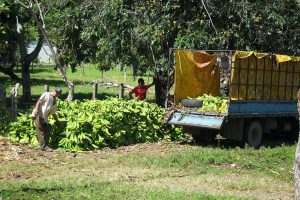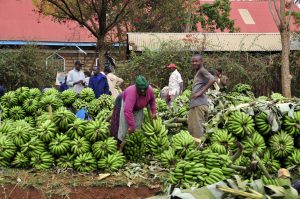Upon grabbing a banana from any grocery store, you will most likely find Chiquita Brand’s familiar blue sticker. Though this universal indicator of Chiquita may bring you a sense of comfort in your piece of fruit, perhaps instead it should push you away.
One of the first scandals involving Chiquita Brands, then the United Fruit Company, broke over two decades when the Cincinnati Enquirer published “Chiquita Secrets Revealed.” In their scathing examination of the company, journalists Michael Gallagher and Cameron McWhirter shed light on Chiquita’s involvement in environmental destruction, human rights violations, and corrupt practices. As it turns out, it is not hard to find scandals caused by the company.
The Birth of an Industry
Before Chiquita, bananas were not the staple of American and European diets that they are today. However, after several marketing campaigns throughout the 1900’s, boasting the nutritional value, delicious taste, and self-packaging of bananas, the world grew to love them. Adriana Gutierrez, from the Romance Languages and Literatures Department at Harvard College, told the HPR, “the popularity [of the banana] initially was part of [Chiquita’s] marketing enterprise, with the jingle song and its advertisements, [but] now advertisements for bananas [are unnecessary] because everybody knows and everybody likes them.”
Not all of Chiquita’s publicity resulted from innocent TV commercials though. In the early twentieth century, Chiquita hired scientists, including Samuel Cate Prescott of the Massachusetts Institute of Technology, to produce research studies and publish outdated research which showing the banana’s healthiness over other fruits. Benjamin Shuldiner, a lecturer at Hunter College’s School of Education, spoke to the HPR about his research on the company, revealing that Prescott, specifically, “was on payroll for the United Fruit Company and would write research for them.”
Through intensive advertisements and widely-publicized research studies, the United Fruit Company successfully created an enormous demand for bananas in its early years. “If it weren’t for United Fruit,” Peter Chapman wrote in his book, Bananas, “the banana would never have emerged from the dark, then arrived in such quantities as to bring prices that made it available to all.”
Negative Environmental Impact
The drastic increase in the banana’s popularity over the 20th century provided room for the expansion of the industry. Now, the annual production of bananas is upwards of 60 million tons. In Chiquita’s case, huge amounts of production, however, bring tremendous environmental destruction with the industry’s expansion. In addition to massive deforestation in regions from which the United Fruit Company produced bananas, “the company [has used] pesticides, especially in Guatemala and in Honduras, that are very well known to the U.S. to be carcinogenic,” Adrianna Gutierrez told the HPR. These toxic chemicals are illegal in Europe, the United States, and Canada; however, Chiquita continues to use these pesticides, valuing production efficiency over environmental and worker welfare.
Furthermore, Chiquita’s single-crop agriculture over large swathes of Latin America proves bad for the soil. The practice does not allow for the circulation of crops, which has been known for many centuries to be necessary for maintaining a healthy variety of nutrients in the soil. Making matters worse, Chiquita only uses one variety of banana. This can be problematic, as Adriana Gutierrez told the HPR, because with only one type of banana planted, “a disease of the banana, [can wipe out] the whole crop.” As there are fewer and fewer varieties of banana used for production, crops become more susceptible to disease.
In her discussion, Gutierrez described the Cavendish variety of cultivated bananas, which makes up about 47 percent of banana production today. Shuldiner elaborated on how the United Fruit company was able to choose which banana variety to popularize, explaining, this type of banana is “the easiest one to transport, it’s the bigger one” and since the United Fruit Company controlled the market, its “monopolistic control [had the ability] to set the market, and that’s what it did.” The United Fruit Company used the Shuldiner banana to create and dominate a worldwide banana market, building itself into the Chiquita empire we know today.
Worker Treatment
Chiquita’s harm goes beyond environmental impacts. The Chiquita website states that, “in the 1990s, Chiquita began an employee home ownership program that has enabled our employees in Honduras, Guatemala and Costa Rica to become independent homeowners.” Though, this initially appears to be a benevolent and empowering program, it gives Chiquita complete control over both their workers’ jobs and houses. Under this program, when a worker gets fired, the worker also loses his or her house. As a result, workers stay at Chiquita under bad working conditions, since they are aware that if they leave, they stand to lose their not only their source of income, but also their house.

Bananas going to market, November 2011.
On a systematic level, several reports show that Chiquita has fired union activists and suppressed union activities. Moreover, in Honduras, there are systems which alert Chiquita supervisors when they can fire workers without having to provide benefits or pay above the minimum wage. Unfortunately, Chiquita, as the main employer in several regions throughout Latin America, has the ability to treat its workers as it pleases, since many people have few options besides Chiquita.
Marc Melitz, a professor of Political Economy at Harvard, emphasized to the HPR that it is problematic for Chiquita to “[have] a huge amount of market power [since] instead of [influencing just] the price of bananas, [companies like Chiquita can also] influence the wages…and the conditions of work”. This is concerning, because “if a single firm is the dominant one in the region, they know that they can get away with paying relatively lower wages because there are no alternatives and they can also get away with having lower standards in terms of other dimensions of how they treat their workers.” As a result of its tremendous market power, Chiquita can mistreat its workers, yet continue to reap the rewards of their labor.
Political Corruption
Despite the harm Chiquita is doing to the environment and its workers, the company is virtually untouchable because of its vast political influence in the United States and Latin America. Melitz told the HPR that political influence typically “generates a huge amount of distortions.” The phenomenon Melitz described applies to Chiquita’s influence over Latin American governments.
Between 1997 and 2004, U.S. Federal Prosecutors proved that Chiquita had paid the equivalent of approximately $1.7 million to the United Self-Defense Forces of Colombia, in order to protect regions in Colombia which had high concentrations of Chiquita-owned plantations and communities. As control over regions in which Chiquita worked vacillated between terrorist groups, Chiquita also paid the National Liberation Army and its enemy, Revolutionary Armed Forces of Colombia, in order to protect its business. The federal prosecutors demonstrated that prior to prosecution, Chiquita senior executives were aware of these transactions and chose to ignore them.
This political meddling happened in the United States as well. In the 1990s, Carl Lindner, then the C.E.O. of Chiquita, frequently used his close political ties and generous financial gifts to U.S. politicians to help him in securing legislation which would increase his profits. For example, several U.S. politicians during this era pressured Europe to reverse legislation which instituted quotas on banana imports. “Having a huge amount of monopoly power is very helpful in other aspects so [Chiquita]can use [its]political influence to get very favorable regulation passed,” Melitz told the HPR. A company with this power can “weaken regulation or environmental standards relative to what a bunch of decentralized banana farmers would be able to do.” Clearly, in many instances, Chiquita has wronged the countries it operates in. Moreover, these examples of political influence demonstrate how Chiquita is rarely held responsible for the harm it causes.
Economic Impact
Gutierrez stressed that an assessment of how Chiquita impacts the Latin American economy depends on ideas about how an economy should function. If you think that the economy should serve the people of the country, then it has had a very negative impact.” Although some argue that Chiquita provides jobs for Latin America, she said, “I’m not sure that providing low quality, high risk jobs is an advantage in any case.”
Shuldiner echoed this and framed it in historical terms, expressing to the HPR that the United Fruit Company “brought jobs, it brought […] modernism, it brought trains, it brought electricity [… but] what it also brought was environmental destruction, [and] danger, [since] these jobs [were] not easy.”
Similarly, Alberto Castillo-Ventura, a Teaching Fellow in the Romance Languages and Literature Department at Harvard College and an immigrant from Guatemala, described that most aspects of life in Guatemala in the mid-20th Century were always influenced by Chiquita in one way or another.
He discussed that in addition to Chiquita’s monopolies on ports and railroads, “they had [… monopolies on] communications, they had monopolies on the telegraph, on the mail. […] the electric company of Guatemala was also provided by [Chiquita]. This was a monopoly that [went] beyond just the production of bananas […] because it was so far reaching to many other aspects of everyday life.” In essence, Chiquita maintains a stranglehold over the Latin American economy, which allows it to do as it pleases with little risk of repercussion.
Chiquita’s Core Values
The format of the Chiquita business is quite common—a company founded by white men based in the United States, using the resources and labor of developing countries for the service of the first world. Ben Shuldiner told the HPR, “they basically came in and controlled these countries and they thought […] that they were civilizing these folks but it was really slave labor or very low wage labor. It destroyed a lot of their environment.”
By using economic, political, and social pressure, Chiquita has and continues to influence the actions and culture of Latin American countries. When the fruit company brags, “As part of our core values, Chiquita maintains a solid commitment to conducting its business ethically, morally and in accordance with the law,” it’s fair to be skeptical.
Correction June 16th, 2017:
An earlier version of this piece reported Marc Melitz as saying specifically that Chiquita creates a political distortion whereas he was actually speaking broadly to the political impact of agricultural and food processing companies.
Image credit: Flickr/CIAT// Wikimedia/Milei.vencel
